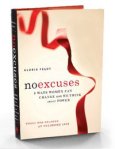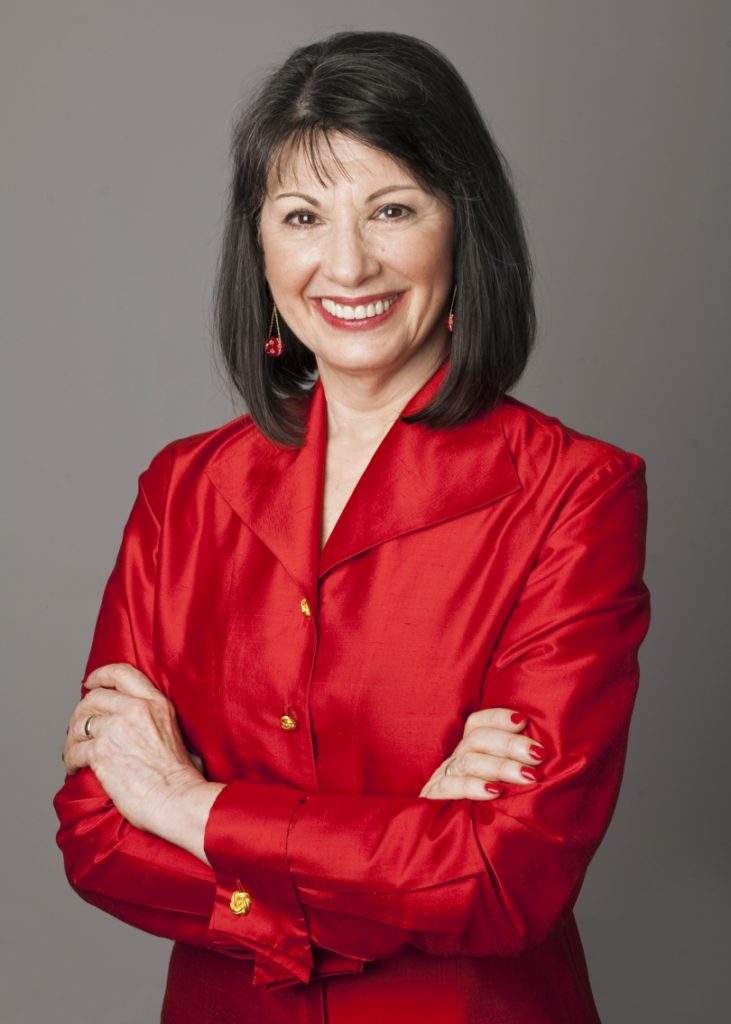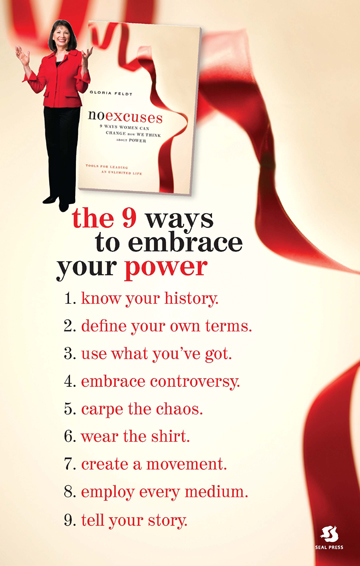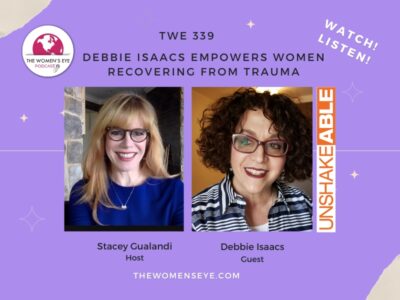UPDATE 9/10/13: Gloria has co-founded Take the Lead, a movement to prepare and inspire women to take their fair and equal share of leadership positions by 2025.
By Pamela Burke/December 29, 2010
Gloria Feldt has a passion for bettering women’s lives. She’s a renowned activist, commentator, teacher, and author. In her early years as a mother of three living in west Texas, she called herself a “desperate housewife.” Yet she rose to find her voice as President and CEO of Planned Parenthood from 1996-2005.
“It’s up to us to develop a more positive relationship with power, to define power on our terms and embrace it…” Gloria Feldt
 Her most recent book “No Excuses–9 Ways Women Can Change How We Think About Power” has been received with widespread praise. It’s been called “groundbreaking” and “attitude-changing,” and “the most daring.”
Her most recent book “No Excuses–9 Ways Women Can Change How We Think About Power” has been received with widespread praise. It’s been called “groundbreaking” and “attitude-changing,” and “the most daring.”
I’ve known Gloria for several years now and have attended her inspiring lectures. She’s certainly embraced her own power as her book is climbing best-seller lists. I am delighted I had the opportunity to ask Gloria how she finally found her own identity and to get her advice for others as we begin 2011…
EYE: You’ve wrestled with finding your own voice throughout your life. Do you think the struggle is finally over?
GLORIA: I am only now truly finding my own authentic and unedited voice. It was a great privilege to be able to make my passion for women’s equality and justice into my life’s work for 30 years.
But what I discovered is that just as I’d allowed myself to be subsumed and led by what the culture expected of me as a young woman, I did what was wanted and needed of me to advance the cause as a movement leader.
 Then, the first book I wrote after I left Planned Parenthood started out as Kathleen Turner’s biography, “Send Yourself Roses,” but to be marketable it became her memoir. I was the co-author, yet writing in her voice. Writing someone else’s life is like getting a year’s free psychotherapy.
Then, the first book I wrote after I left Planned Parenthood started out as Kathleen Turner’s biography, “Send Yourself Roses,” but to be marketable it became her memoir. I was the co-author, yet writing in her voice. Writing someone else’s life is like getting a year’s free psychotherapy.
I was confronted with the reality that I’d done it again–followed the same pattern of subsuming my voice to others.
So now, in this third act of my life, my power struggle has been to get clear about and stay with my own intention: to write my fourth book in my own true voice that speaks to other women about our ambivalent relationship with power.
And I’m very pleased with the response from women of all ages like comments you can read on Manisha Thakor’s website. She’s the founder of the Women’s Financial Literacy Initiative.
“Women can now raise money as well as men, are trusted by the voters more than men, and when they run they are statistically as likely to win.”
EYE: What inspired you to write “No Excuses”? Was it your personal experience?
GLORIA: They say you write the book you need to read. “No Excuses” turned out to be exactly that. The direct trigger was when I researched an article for Elle Magazine in 2008. I looked at the many organizations that help women run for office.
I found that despite their excellent programs, they have scarcely moved the dial in the last two decades. Women are 51% of the population, 54% of the voters, and 17% of Congress, 23% of state legislatures, and 10% of the mayors of the 100 largest cities.
But what really blew me away researching “No Excuses” was to find that it was no longer external barriers holding women back. Women can now raise money as well as men, are trusted by the voters more than men, and when they run they are statistically as likely to win.

EYE: Can you give an example of a woman who conquered injustice and used her power well?
GLORIA: Lilly Ledbetter is a great example. When she found out that she was paid less than her male co-workers at the Goodyear Tire and Rubber Company, she began the fight for women and girls who deserved equal pay for equal work.
Another interesting person is Courtney Martin who interviews the next generation of activists in her new book “Do It Anyway” and urges young people to engage in philanthropy.
EYE: What do you think is holding some women back?
GLORIA: It turns out that the same dynamics exist in the workplace as well and in personal relationships. Women have an ambivalent relationship with power. Not necessarily less ambition than men, but less intention to hold positions that society deems powerful.
You can’t win public office if you don’t run. You can’t become an executive if you don’t put your name in the hat. It matters that we do reach our full potential including taking our rightful equal place making the policies and products that affect our lives.

EYE: You talk about Kathryn Bigelow winning the Academy Award and how that could have been a more empowering moment for women. How?
GLORIA: She could have said, “I am honored to be the first woman and I hope that my success will inspire many more women to do what I have done, as well to encourage the Academy to look to the many talented women directors.”
Sally Hawkins, the star of the movie “Made In Dagenham” about the 1968 strike by women workers at Ford Motor Company in the UK over gender pay discrimination, said this to journalist Jessica Wakeman at thefrisky.com: “If you’re a woman and you say that you’re not a feminist then you’re an idiot, basically. How can you not be passionate about our rights? It doesn’t make any sense.”
That’s the kind of comment that Bigelow might have made if she wanted to be more than an Oscar winner but also a woman who helps other women succeed.
“It’s up to us to develop a more positive relationship with power, to define power on our terms…”
EYE: You say women are stuck. We’ve broken the glass ceiling in so many places, yet you say we haven’t reached our full potential. Why?
GLORIA: Ambivalence about power stands in the way. Every door has been opened at least once and we’ve changed the laws. We’ve come a very long way. I celebrate that. To complete the journey though women must continue walking through the doors that are open.
No one will do that for us. Why should they? It’s up to us to develop a more positive relationship with power, to define power on our terms and embrace it, stand in it, and walk with intention to lead our own dreams.
Power over is oppression; power-to is leadership. Power over is from Mars. Power-to is from Venus. Women love having the power-to.
 EYE: You quote Roseanne: “The thing women have to learn is no one gives it to you–you have to take it.” Is that the best way to gain power?
EYE: You quote Roseanne: “The thing women have to learn is no one gives it to you–you have to take it.” Is that the best way to gain power?
GLORIA: It’s the only way. And don’t expect anyone to attribute more power to you than you attribute to yourself.
EYE: Why do some women come to power and then, as you say, step back?
GLORIA: It’s hard to change a culture while you’re living in it. Sometimes it’s just a lot easier not to take on the responsibility of power, or even the responsibility to make our own choices. Sometimes, women become discouraged or are coopted by those who belittle them when they strive for more. There are many reasons but I say there are no excuses any more.
“When you can stand in your power, it’s no longer as enticing to play the passive-aggressive…”
EYE: You say we take the boniest part of the chicken and leave the rest. That’s not exactly a compliment. What do you mean by this?
GLORIA: Women are socialized to think of others first. That’s not a bad thing, or wouldn’t be if men were also socialized the same way. Recently I said in a speech to a group of women that no one loves you more because you’ve used yourself up for them.
A murmur or recognition went across the auditorium and it was the most quoted line in the post-event blogs and comments. When you can stand in your power, it’s no longer as enticing to play the passive-aggressive or the martyr as many of our own mothers did.
EYE: You call your book a “battle cry for women.” What is it they have to do to gain this power you say is so important?
GLORIA: I think I said it is a clarion call. Wake up, sisters. Use the 9 Ways:
EYE: In spite of a lot of negative stats about just how far women have come in some respects, you seem optimistic. Do you think women are beginning to take on this “No Excuses” attitude of yours or do we have a long way to go?
GLORIA: Both. I wrote “No Excuses” to speed the dial of progress. At the current rate, it’ll be 70 years till women reach parity. I don’t think that’s right or fair. And besides, I can’t live that long. And as an activist for 40 years, I want to see us do better.
That’s why I devote at least half the book to the 9 Ways, specific and practical “power tools” women can use to help themselves cope with the challenges, stand in their own power, and ultimately to lead unlimited lives. I invite readers to my website www.GloriaFeldt.com, and especially to join the conversation on the 9 Ways blog, www.GloriaFeldt.com/9ways.
EYE: Are you feeling more power within yourself now with the publication of your book?
GLORIA: Absolutely. And I remind myself of No Excuses’ lessons several times a day. I revised my language several times in this q and a to avoid self-deprecating comments that diminish how I represent myself and thus dissipate the power of my words and ideas.
EYE: Thanks, Gloria. There should be No Excuses after reading your 9 Ways’ List!
Top Photo of Gloria by Maryann Russell






Leave a Reply